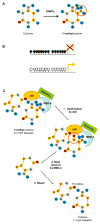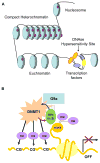Epigenetic mechanisms in systemic lupus erythematosus and other autoimmune diseases
- PMID: 21885342
- PMCID: PMC3225699
- DOI: 10.1016/j.molmed.2011.07.005
Epigenetic mechanisms in systemic lupus erythematosus and other autoimmune diseases
Abstract
The pathogenic origin of autoimmune diseases can be traced to both genetic susceptibility and epigenetic modifications arising from exposure to the environment. Epigenetic modifications influence gene expression and alter cellular functions without modifying the genomic sequence. CpG-DNA methylation, histone tail modifications and microRNAs (miRNAs) are the main epigenetic mechanisms of gene regulation. Understanding the molecular mechanisms that are involved in the pathophysiology of autoimmune diseases is essential for the introduction of effective, target-directed and tolerated therapies. In this review, we summarize recent findings that signify the importance of epigenetic modifications in autoimmune disorders while focusing on systemic lupus erythematosus. We also discuss future directions in basic research, autoimmune diagnostics and applied therapy.
Copyright © 2011 Elsevier Ltd. All rights reserved.
Conflict of interest statement
The authors have no conflicts of interest.
Figures



References
-
- Hedrich CM. Genetic Variation and Epigenetic Patterns in Autoimmunity. J Genet Syndr Gene Ther. 2011 doi: 10.4172/2157-7412.10000e2. ( http://omicsonline.org) - DOI
-
- Renaudineau Y, Youinou P. Epigenetics and autoimmunity, with special emphasis on methylation. Keio J Med. 2011;60(1):10–6. - PubMed
-
- Gualtierotti R, et al. Updating on the pathogenesis of systemic lupus erythematosus. Autoimmun Rev. 2010;10(1):3–7. - PubMed
Publication types
MeSH terms
Substances
Grants and funding
LinkOut - more resources
Full Text Sources
Other Literature Sources
Medical

